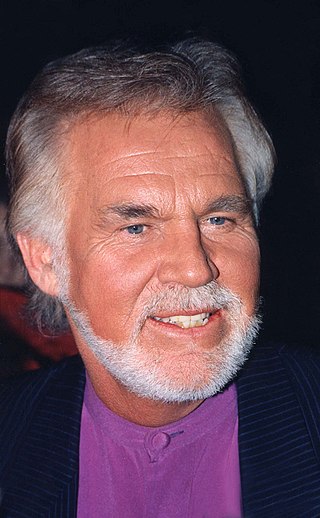
Kenny Rogers was an American singer and songwriter. He was inducted into the Country Music Hall of Fame in 2013. Rogers was particularly popular with country audiences but also charted more than 120 hit singles across various genres, topping the country and pop album charts for more than 200 individual weeks in the United States alone. He sold more than 100 million records worldwide during his lifetime, making him one of the best-selling music artists of all time. His fame and career spanned multiple genres: jazz, folk, pop, rock, and country. He remade his career and was one of the most successful cross-over artists of all time.

The Gambler is the sixth studio album by American singer Kenny Rogers, released by United Artists in November 1978. One of his most popular, it has established Rogers' status as one of the most successful artists of the 1970s and 1980s. The album reached many markets around the world, such as the Far East and Jamaica, with Rogers later commenting "When I go to Korea or Hong Kong people say 'Ah, the gambler!'". The album has sold over 5 million copies.

"The Devil Went Down to Georgia" is a song written and recorded by American music group Charlie Daniels Band and released on their 1979 album Million Mile Reflections.

"Islands in the Stream" is a song written by the Bee Gees and recorded by American country music artists Kenny Rogers and Dolly Parton. It was released in August 1983 as the first single from Rogers's fifteenth studio album Eyes That See in the Dark. The Bee Gees released a live version in 1998 and a studio version in 2001.
"Ruby, Don't Take Your Love to Town" is a song written by Mel Tillis about a paralyzed veteran who lies helplessly as his wife "paints up" to go out for the evening without him; he believes that she is going in search of a lover. As he hears the door slam behind her, he claims that he would murder her if he could move to get his gun, and pleads for her to reconsider. A line in the song about a "crazy Asian war" and the time of the song's release led to the assumption that the song was about a veteran of the Vietnam War, though this was never stated in the lyrics. However, Tillis stated that the song was about a veteran of World War II.
This is a list of notable events in country music that took place in the year 1979.
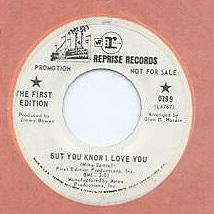
"But You Know I Love You" is a song written by Mike Settle, which was a 1969 pop hit for Kenny Rogers and The First Edition, a group that included Settle and Kenny Rogers. The song also became a major country hit by Bill Anderson in 1969. In 1981, a cover version of "But You Know I Love You" by singer Dolly Parton topped the country singles charts.

"Help Me" is a love song written, produced, and performed by Joni Mitchell and released on her 1974 album Court and Spark. The song was recorded with jazz band Tom Scott's L.A. Express as the backing band.

"Coward of the County" is a song written by Roger Bowling and Billy Edd Wheeler and recorded by American country music singer Kenny Rogers. The song was released in November 1979 as the second single from Rogers' multi-platinum album Kenny. It became a major crossover hit, topping the Billboard Country chart and reaching number three on the Hot 100 chart; it also topped the Cash Box singles chart and was a Top 10 hit in numerous other countries worldwide, topping the chart in Canada, the UK and Ireland, where it remained at number one for six consecutive weeks.
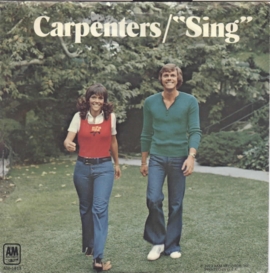
"Sing" is a 1971 song written by Joe Raposo for the children's television show Sesame Street as its signature song. In 1973, it gained popularity when performed by Carpenters, a #3 hit on the Billboard Hot 100.
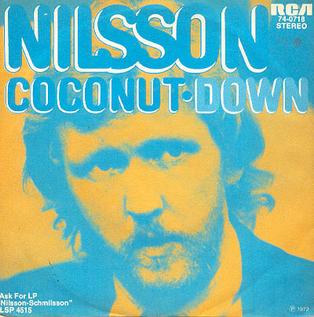
"Coconut" is a novelty song written and first recorded by American singer-songwriter Harry Nilsson, released as the third single from his 1971 album, Nilsson Schmilsson. It was on the U.S. Billboard charts for 14 weeks, reaching #8, and was ranked by Billboard as the #66 song for 1972. It charted in a minor way in the UK, reaching #42. "Coconut" did best in Canada, where it peaked at #5.

"Elvira" is a song written and originally recorded by Dallas Frazier in 1966 on his album of the same name. Though a minor hit for Frazier at the time of release, the song became a bigger and much more famous country and pop hit by The Oak Ridge Boys in 1981. "Elvira" is now considered one of the Oak Ridge Boys' signature songs.

"She Believes in Me" is a song recorded by American country music singer Kenny Rogers. It was released in April 1979 as the second single from his 1978 album The Gambler. The song was written by American singer-songwriter Steve Gibb who first released his version as a 7" single in 1978. A version by T. G. Sheppard appears on his 1978 album Daylight, released a month before Rogers' album.

"We've Got Tonite" is a song written by American rock music artist Bob Seger, from his album Stranger in Town (1978). The single record charted twice for Seger, and was developed from a prior song that he had written. Further versions charted in 1983 for Kenny Rogers as a duet with Sheena Easton, and again in 2002 for Ronan Keating.

"Two Out of Three Ain't Bad" is a power ballad performed by the American musician Meat Loaf. It is a track off his 1977 album Bat Out of Hell, written by Jim Steinman. It spent 23 weeks on the Billboard Hot 100, peaking at No. 11, and earned a million-selling Gold single from the RIAA, eventually being certified platinum. It remains his second-highest-charting hit in the US, behind "I'd Do Anything for Love " (1993), and stands as one of his career signature tunes.
"Hair" is the title song to the 1967 musical Hair and the 1979 film adaptation of the musical.

Donald Allen Schlitz Jr. is an American songwriter who has written more than a score of number one hits on the country music charts. He is best known for his song "The Gambler", and as the co-writer of "Forever and Ever, Amen", and "When You Say Nothing at All". For his songwriting efforts, Schlitz has earned two Grammy Awards, and four ASCAP Country Songwriter of the Year awards.
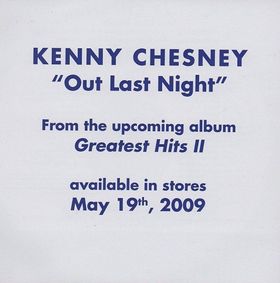
"Out Last Night" is a song co-written and recorded by American country music singer Kenny Chesney. It was released on April 6, 2009 as the first single and only new track on his compilation album Greatest Hits II. The song reached number one on the U.S. Billboard Hot Country Songs chart, becoming his thirty-eighth top 40 hit in the United States. Chesney wrote this song with Brett James.
"Heroes and Friends" is a song co-written and recorded by American country music artist Randy Travis. It was written with Don Schlitz. It was released in January 1991 as the second and final single from his album of duets, Heroes & Friends and his only song on the album that was not a duet. The song opens and closes the album. "Heroes and Friends" peaked at number 3 on the Billboard Hot Country Singles & Tracks chart and reached number 1 on the Canadian RPM Country Tracks chart.
"Love Lifted Me" is a hymn first published in 1912, with text by English-American lyricist James Rowe and melody by American organist Howard E. Smith.















